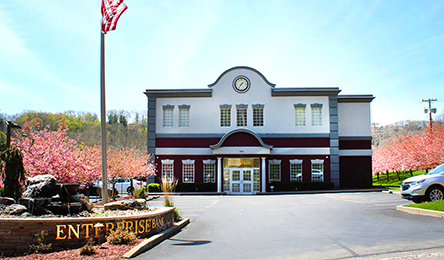The Small Business Administration (SBA) is a government agency whose mission is to “maintain and strengthen the nation's economy by aiding, counseling, assisting and protecting the interests of small businesses and by helping families and businesses recover from national disasters” (www.sba.gov). They are most well known for the financial assistance they provide through government guarantees of small business loans made through private financial institutions like Enterprise Bank. Enterprise Bank is a Preferred Lending (PLP) partner of the SBA, which is the highest level of SBA lending authority delegated to a private sector financial institution as further described below. Enterprise Bank’s staff has many years of SBA lending experience and includes former long term SBA employees.
SBA loan guarantees offer many advantages to both the Bank and the small business client. They allow the financial institution to expand the types of businesses and industries that it can lend to. An SBA loan guarantee mitigates much of the risk associated with startup or newer businesses, new or emerging industries or industry types that traditionally pose above average failure rates. Also, an SBA loan guaranty can be an effective tool for the Bank in mitigating the collateral risk in loan transactions that are under-collateralized or in non-hard asset intensive businesses, like service or technology based companies.
For the small business client, having an SBA backed loan can also allow the Bank to provide longer repayment terms, resulting in lower monthly payments and debt service requirements for owners. In addition, SBA loans can sometimes help business owners access financing with smaller down payment and/or equity requirements than traditional bank financing.
Two of the most common types of SBA loans are the 7(a) Loan Guarantee Program and the SBA 504 Loan Program.
1. The 7(a) Loan Guarantee Program is the SBA’s flagship loan program. It's simple: a business applies to a lending institution for a loan. If the lender feels that the business or the loan request would be outside of its conventional loan parameters, but still feels that the company is a good credit risk, it can request the SBA to guarantee or insure a portion of the loan to the Bank. If the business meets the eligibility and credit criteria of the 7(a) program, the lender can then receive a government guarantee from SBA for between 50% and 90% of the loan amount, depending on the size and type of loan requested.
2. The SBA 504 Loan Program increases access to capital for small businesses and supports financial institutions in their lending activities to those businesses. Rather than providing a loan guaranty on the Bank’s loan as it does under the SBA 7(a) loan guaranty program, the SBA 504 program is a “gap financing” program, where real estate and equipment projects are funded by a combination of a private sector financial institution like Enterprise Bank providing 50% of the necessary project funding, and the SBA providing up to 40% of the total project funding through the sale and guaranty of a long term fixed rate bond, and the remaining 10% being provided through an equity contribution from the borrower. Because the SBA portion of the 504 project is funded through a 100% government guaranteed debenture bond, the SBA is able to offer the small business borrower a ten or twenty year below market fixed interest rate on the SBA 504 portion of the project. In exchange for providing these below market fixed rates, and equity requirements that are usually much lower than traditional bank financing, the SBA 504 program requires the business borrower to either create or retain jobs, or promote other SBA public policy goals like rural development, exporting, or business district revitalization.
If you feel that you might qualify for either the 7(a) or 504 loan programs, or are seeking financing which may require SBA backing, contact Enterprise Bank at (412) 487-6048. And for more information on SBA's loan programs and resources please review the Agency's most recent SBA Small Business Resource Guide. This guide is produced by the SBA and contains a wealth of information regarding the SBA, its programs, and other organizations and programs in the area that can provide additional guidance when starting or expanding a small business.
Enterprise Bank is part of SBA’s Preferred Lenders (PLP) Program. PLP lenders have demonstrated long-term experience and success with the SBA’s lending programs, and have received delegated authority from the SBA in making credit decisions on most loans within the SBA 7(a) program umbrella, with SBA involvement at the individual loan level limited in most cases to only an online eligibility check. This allows SBA Preferred Lenders like Enterprise and their small business applicants to make the SBA loan process much faster and flexible than for those businesses working with less SBA experienced banks or lenders.
Enterprise Bank consistently ranks among the top SBA PLP participants for the Western Pennsylvania region and does the most SBA lending in Western PA in comparison to its asset size. Our Relationship Managers work regularly with the SBA to help clients obtain not only loans, but also government contracts, technical assistance, and other support services and programs that SBA provides.
Enterprise Bank offers the full range of SBA financing available by participating not only in the Preferred Lender Program, but also in SBA’s specialty programs like SBA Express, Export Express, Contract Caplines, Seasonal Caplines, Working Capital Caplines, Export Working Capital Loans, and International Trade Loans among others.
To find out more about accessing an SBA loan with Enterprise Bank specific to your business needs, call (412) 487-6048. We will match you up with one of our experienced Relationship Managers, who will work with you closely on the SBA programs that will best fit you and your business.






